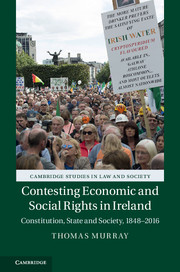Book contents
- Frontmatter
- Dedication
- Contents
- Acknowledgments
- Introduction: The Politics of Economic and Social Rights
- 1 Constitution ‘from Below’ in Ireland: 1848–1922
- 2 ‘Not Alone Personal Liberty but Economic Freedom’: Socio-economic Rights in the Making of the 1922 Irish Free State Constitution
- 3 ‘Highly Dangerous’? Socio-economic Rights in the Making of the 1937 Irish Constitution
- 4 Contesting the Irish Constitution and the World-System: 1945–2008
- 5 The Polarities of Justice and Legal Business
- 6 Contesting Property Rights
- 7 Contesting Trade Union Rights
- 8 Contesting Family, Education, andWelfare Rights
- 9 Reproducing the Value-Consensus State
- 10 Constitution ‘from Below’ in Ireland: 1945–2008
- Conclusion: Contesting Economic and Social Rights Today
- Bibliography
- Index
Conclusion: Contesting Economic and Social Rights Today
Published online by Cambridge University Press: 05 August 2016
- Frontmatter
- Dedication
- Contents
- Acknowledgments
- Introduction: The Politics of Economic and Social Rights
- 1 Constitution ‘from Below’ in Ireland: 1848–1922
- 2 ‘Not Alone Personal Liberty but Economic Freedom’: Socio-economic Rights in the Making of the 1922 Irish Free State Constitution
- 3 ‘Highly Dangerous’? Socio-economic Rights in the Making of the 1937 Irish Constitution
- 4 Contesting the Irish Constitution and the World-System: 1945–2008
- 5 The Polarities of Justice and Legal Business
- 6 Contesting Property Rights
- 7 Contesting Trade Union Rights
- 8 Contesting Family, Education, andWelfare Rights
- 9 Reproducing the Value-Consensus State
- 10 Constitution ‘from Below’ in Ireland: 1945–2008
- Conclusion: Contesting Economic and Social Rights Today
- Bibliography
- Index
Summary
In the middle-run (that is, the next 20–40 years), the debate is fundamental and total. There is no compromise. One side or the other will win. I call this the battle between the spirit of Davos and the spirit of Porto Alegre. The spirit of Davos calls for a new non-capitalist system that retains its worst features – hierarchy, exploitation, and polarization. They could well install a world-system that is worse than our present one. The spirit of Porto Alegre seeks a system that is relatively democratic and relatively egalitarian…[T]he chances of tilting the bifurcation in our direction depends on us. The odds are fifty-fifty. It follows that our efforts as activists are not merely useful; they are the essential element in our struggle for a better world.
– Immanuel WallersteinWe are also going to go about raising a struggle in order to demand that we make a new Constitution, new laws which take into account the demands of the Mexican people, which are: housing, land, work, food, health, education, information, culture, independence, democracy, justice, liberty and peace. A new Constitution which recognizes the rights and liberties of the people, and which defends the weak in the face of the powerful.
– Zapatista Army of National LiberationThe contemporary moment of crisis, austerity, and struggle illustrates how diverse groups across the political spectrum can use the discourse of universal human rights ideologically, which is to say in a manner that promotes particular forms of politics in order to advance particular interests and values. In the Republic of Ireland, the state considers its commitment to socio-economic rights to be compatible with continuing austerity policies in pursuit of economic growth. In June 2015, the government's submission to the United Nations Committee for Economic, Social, and Cultural Rights effectively reaffirmed this position. Conversely, trade unions and NGOs continue to demand that socio-economic rights be realised more immediately through state intervention and constitutional entrenchment. Throughout 2015, the Right2Water campaign helped mobilise tens of thousands of people in support of the constitutional recognition of rights to water and to housing, as well as rights to jobs and decent work, to health, to debt justice, to education, and to democratic reform. The campaign sought a ‘Progressive Irish Government’ to implement these aims.
- Type
- Chapter
- Information
- Contesting Economic and Social Rights in IrelandConstitution, State and Society, 1848–2016, pp. 326 - 353Publisher: Cambridge University PressPrint publication year: 2016



